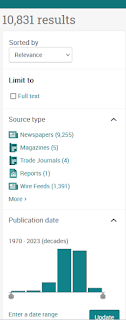The Ohlone tribes of the San Francisco Bay Area are news makers and shakers. Anyone can keep up with the triumphs, challenges, and stories from Ohlone tribes and their members by reading the news. Here are some tips for searching SFPL electronic news sources to stay abreast of the most recent goings-on.
Recommended SFPL News Databases
America's News (Newsbank platform)
Connect to this database (SFPL Library card required)
This database provides news articles from about 2,200 news outlets across the USA, including traditional print newspapers, news websites, blogs, radio programs, television programs, and other media.
- Pros: Search many news sources at once; Includes many California newspapers up to the most current issues, e.g. San Francisco Chronicle, Oakland Tribune, San Jose Mercury News, and Sacramento Bee.
- Cons: It does not include current articles from the Los Angeles Times or the New York Times, and it only has San Francisco Examiner content from 2008 - 2016 (and only web content at that); it's a little difficult to share lists of results with someone
US Newsstream (ProQuest platform)
Connect to this database (SFPL Library card required)
This database provides news articles from about 1,300 news outlets across the USA, including traditional print newspapers, news websites, blogs, radio programs, television programs, and other media.
- Pros: Search many news sources at once; Includes current articles from the San Francisco Examiner, Los Angeles Times, and the New York Times; it's very easy to share result lists with others by generating a share link
- Cons: Does not provide current articles from other California newspapers
Searching Tips
Library databases don't exactly work like a Google search, for better and for worse. You want to be strategic about keywords and other ways to refine your search, and not to use long phrases or questions. Thankfully, these two are pretty similar so you can use the tips below in either one.
Keywords:
The keywords you pick should represent the concepts you're curious about in the most basic form. Think of one word to describe each concept rather than a long phrase or question.
A simple search for Ohlone brings back tens of thousands of results. Try combining two or more keywords, or use specific names.
For example, try "Muwekma Ohlone," "Ramaytush Ohlone," or "Tamien Nation" in quotes to find articles mentioning these tribes by name, in the exact order the words appear.
Another example: put Ohlone DNA in the search box to find articles about the recent scientific break through of DNA evidence connecting current members of Muwekma to thousands-year-old remains in their ancestral homeland. You'll have results containing the words Ohlone and DNA anywhere in the record, but not side-by-side as a phrase. It is not necessary to connect the terms with the word and.Sorting and filtering results:
Check out the left side bar of the result screen in either database. Use the Sort by tool to change the ranking to date (newest) or most recent first to see the most current news. For complex searches using many keywords and other strategies, a relevancy ranking may be more helpful. You can also use the date tool in the left panel to narrow to a specific time period. If the format of the news is important to you, you can use the Source Type tool to limit results to specific formats, for example newspapers or news wires.
 |
| Refinement tools in US Newsstream are located on the left of the result screen |
Follow the Ohlone in the news:
Create an alert from the database to get notified at desired intervals. Look for the Save Search/Alert tool in the top right corner of the screen to get the chance to set up email notifications when new articles matching your search terms appear in the database. |
| Search alert tools in US Newsstream are located on the top right of the result screen |
 |
| Search alert tools in America's News are located at the top center of the results screen |
More Tips
Sample Search Results
Try these searches in either database for practice!
Keywords: ohlone dna "federal recognition"
Limit to: 2022-2023
Which database is better? Do you see the same author names in the results from both databases? While the publications in either database are different, does the content of the articles seem consistent?






.png)
